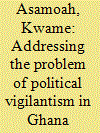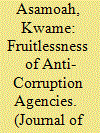| Srl | Item |
| 1 |
ID:
173790


|
|
|
|
|
| Summary/Abstract |
Ghana entered into the Fourth Republic in 1993 after experiencing political instability over two decades. A defining feature that has characterized the Fourth Republic of Ghana and marred Ghana’s democratic credentials is the emergence of political vigilantism. Political vigilantism has basically been perpetuated by the two leading political parties in Ghana: the New Patriotic Party and National Democratic Congress. The major political actors in the political system of Ghana continue to express the debilitating effects of political vigilantism on Ghana’s democratic advancement, nevertheless, it continues to persist in monumental proportion in our political dispensation. Using a qualitative research approach, the paper examines the factors responsible for the pervasiveness of political vigilantism under the Fourth Republic of Ghana and proffer some plausible solutions to address this political canker.
|
|
|
|
|
|
|
|
|
|
|
|
|
|
|
|
| 2 |
ID:
162417


|
|
|
|
|
| Summary/Abstract |
Political corruption has become one of the most topical issues in the political discourse in Ghana. This stems from the fact that corruption has become so endemic and systemic in Ghanaian polity with its negative effects on the economy. Indeed, political corruption negatively affects job creation, investment potentials, infrastructural development and generally the standard of living of the people. It is within this context that anti-corruption institutions have been established in Ghana to address the menace of corruption. The Commission on Human Rights and Administrative Justice (CHRAJ) is one of such institutions established under the 1992 Republican Constitution of Ghana tasked with the responsibility of addressing the problem of corruption in Ghanaian public administration system. This paper examines the extent to which the Commission has achieved this constitutional mandate of addressing the problem of corruption. The study finds that some drawbacks which inhibit the potency of CHRAJ in addressing the problem of corruption include lack of political will by the governing elite to support the institution, eroding confidence of the Commission, the trend of appointing the Head of the Commission in an acting capacity, constitutional weaknesses, poor capacity building support and low motivation. The paper therefore offers pragmatic policy suggestions to address the inherent deficiencies of the Commission with the objective of making it more functional.
|
|
|
|
|
|
|
|
|
|
|
|
|
|
|
|